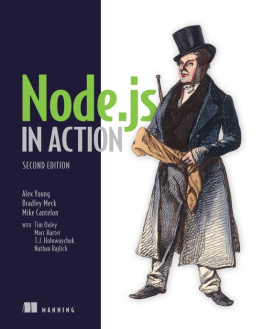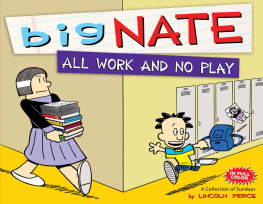Nate Murray - Fullstack Node.js
Here you can read online Nate Murray - Fullstack Node.js full text of the book (entire story) in english for free. Download pdf and epub, get meaning, cover and reviews about this ebook. year: 2019, publisher: leanpub.com, genre: Home and family. Description of the work, (preface) as well as reviews are available. Best literature library LitArk.com created for fans of good reading and offers a wide selection of genres:
Romance novel
Science fiction
Adventure
Detective
Science
History
Home and family
Prose
Art
Politics
Computer
Non-fiction
Religion
Business
Children
Humor
Choose a favorite category and find really read worthwhile books. Enjoy immersion in the world of imagination, feel the emotions of the characters or learn something new for yourself, make an fascinating discovery.

- Book:Fullstack Node.js
- Author:
- Publisher:leanpub.com
- Genre:
- Year:2019
- Rating:3 / 5
- Favourites:Add to favourites
- Your mark:
- 60
- 1
- 2
- 3
- 4
- 5
Fullstack Node.js: summary, description and annotation
We offer to read an annotation, description, summary or preface (depends on what the author of the book "Fullstack Node.js" wrote himself). If you haven't found the necessary information about the book — write in the comments, we will try to find it.
Fullstack Node.js — read online for free the complete book (whole text) full work
Below is the text of the book, divided by pages. System saving the place of the last page read, allows you to conveniently read the book "Fullstack Node.js" online for free, without having to search again every time where you left off. Put a bookmark, and you can go to the page where you finished reading at any time.
Font size:
Interval:
Bookmark:

This book is for sale at http://leanpub.com/fullstacknode
This version was published on 2019-11-26

* * * * *
This is a Leanpub book. Leanpub empowers authors and publishers with the Lean Publishing process. Lean Publishing is the act of publishing an in-progress ebook using lightweight tools and many iterations to get reader feedback, pivot until you have the right book and build traction once you do.
* * * * *
This version of the book is a PRERELEASE. The final version of the book will change from this revision. Please report any bugs you find to us@fullstack.io
Thanks for checking out the early version
Nate & David
- Revision 2p - 2019-11-25
https://newline.co/discord/nodejs
If youd like to report any bugs, typos, or suggestions just email us at: us@fullstack.io.
If youd like to be notified of updates to the book on Twitter, follow us at @fullstackio.
Did you like the book? Did you find it helpful? Wed love to add your face to our list of testimonials on the website! Email us at: .
Node.js was first released in 2009 by Ryan Dahl as a reaction to how slow web servers were at the time. Most web servers would block for any I/O task, such as reading from the file system or accessing the network, and this would dramatically lower their throughput. For example, if a server was receiving a file upload, it would not be able to handle any other request until the upload was finished.
At that time, Dahl mostly worked with Ruby, and the dominant model for web applications was to have a pool of ruby processes that a web server (e.g. Ngninx) would proxy to. If one Ruby process was blocked with an upload, Nginx served the request to another.
Node.js changed this model by making all I/O tasks non-blocking and asynchronous. This allowed web servers written in Node.js to serve thousands of requests concurrently subsequent requests didnt have to wait for previous ones to complete.
The first demo of Node.js was generated so much interest because it was the first time that a developer could create their own web server easily and have it work so well.
Over time Node.js became good at system tasks other than web serving and started to shine as a flexible yet lower level server-side language. It could do anything typically done with Python, Ruby, Perl, and PHP, and it was faster, used less memory, and in most cases had better APIs for the system calls.
For example, with Node.js we can create HTTP and TCP servers with only a few lines of code. Well dive in and build one together soon, but just to show what we mean, heres a functioning Node.js web server in only 80 characters:
01-first-node-api/00-hello-world.jsrequire('http').createServer((req,res)=>res.end('hello world!')).listen(8080)Node.js began to shine with the introduction of npm, the package manager bundled with Node.js. A core philosophy of Node.js is to have only a small collection of built-in modules that come preinstalled with the language.
Examples of these modules are fs, http, tcp, dns, events, child_process, and crypto. Theres a full list in the Node.js API documentation.
This may seem to be a bad thing. Many people would be puzzled as why Node.js would choose not to have a large collection of standard modules preinstalled and available to the user. The reason is a bit counterintuitive, but has ultimately been very successful.
Node.js wanted to encourage a rich ecosystem of third-party modules. Any module that becomes a built-in, core module will automatically prevent competition for its features. In addition, the core module can only be updated on each release of Node.js.
This has a two-fold suppression effect on module authorship. First, for each module that becomes a core module in the standard library, many third-party modules that perform a similar feature will never be created. Second, any core modules will have development slowed by the Node.js release schedule.
This strategy has been a great success. npm modules have grown at an incredible pace, overtaking all other package managers. In fact, one of the best things about Node.js is having access to a gigantic number of modules.
Node.js is a great choice for any task or project where one would typically use a dynamic language like Python, PHP, Perl, or Ruby. Node.js particularly shines when used for:
- HTTP APIs,
- distributed systems,
- command-line tools, and
- cross-platform desktop applications.
Node.js was created to be a great web server and it does not disappoint. In the next section, well see how easy it is to build an HTTP API with the built-in core http module.
Web servers and HTTP APIs built with Node.js generally have much higher performance than other dynamic languages like Python, PHP, Perl, and Ruby. This is partly because of its non-blocking nature, and partly because the Node.js V8 JavaScript interpreter is so well optimized.
There are many popular web and API frameworks built with Node.js such as express, hapi, and restify.
Distributed systems are also very easy to build with Node.js. The core tcp module makes it very easy to communicate over the network, and useful abstractions like streams allow us to build systems using composable modules like dnode.
Command-line tools can make a developers life much easier. Before Node.js, there wasnt a good way to create CLIs with JavaScript. If youre most comfortable with JavaScript, Node.js will be the best way to build these programs. In addition, there are tons of Node.js modules like yargs, chalk, and blessed that make writing CLIs a breeze.
Electron, allows us to build cross-platform desktop applications using JavaScript, HTML, and CSS. It combines a browser GUI with Node.js. Using Node.js were able to access the filesystem, network, and other operating system resources. Theres a good chance you use a number of Electron apps regularly.
Node.js is a dynamic, interpreted language. It is very fast compared to other dynamic languages thanks to the V8 JIT compiler. However, if you are looking for a language that can squeeze the most performance out of your computing resources, Node.js is not the best.
CPU-bound workloads can typically benefit from using a lower-level language like C, C++, Go, Java, or Rust. As an extreme example, when generating fibonacci numbers Rust and C are about three times faster than Node.js. If you have a specialized task that is particularly sensitive to performance, and does not need to be actively developed and maintained, consider using a lower-level level language.
Font size:
Interval:
Bookmark:
Similar books «Fullstack Node.js»
Look at similar books to Fullstack Node.js. We have selected literature similar in name and meaning in the hope of providing readers with more options to find new, interesting, not yet read works.
Discussion, reviews of the book Fullstack Node.js and just readers' own opinions. Leave your comments, write what you think about the work, its meaning or the main characters. Specify what exactly you liked and what you didn't like, and why you think so.




